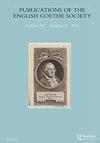Butler’s Winckelmann
IF 0.1
3区 文学
0 LITERATURE, GERMAN, DUTCH, SCANDINAVIAN
引用次数: 0
Abstract
ABSTRACT The book The Tyranny of Greece over Germany (1935) by Eliza Marian Butler is about the development of German intellectual life in the period from Johann Joachim Winckelmann (1717–1768) onwards. Winckelmann is often seen as the man who gave the impetus to a wave of philhellenism in Germany. According to Butler, German intellectuals’ nostalgic longing for Greece and lack of interest in real societal problems bears much responsibility for the cultural collapse of interwar Germany and the rise of Nazism. The ideas that Butler put forward have been of great importance for those who criticize the political use of classical art in public monuments. Discussing Butler’s points of view, this article will take a critical look at her reasons for attributing such a central role in the cultural decline of interwar Germany to Winckelmann’s philhellenism.巴特勒的温克尔曼
摘要Eliza Marian Butler的《希腊对德国的暴政》(1935)一书讲述了从Johann Joachim Winckelmann(1717–1768)开始德国知识生活的发展。温克尔曼经常被认为是推动德国哲学浪潮的人。根据巴特勒的说法,德国知识分子对希腊的怀旧渴望和对现实社会问题缺乏兴趣,对两次世界大战之间德国的文化崩溃和纳粹主义的兴起负有很大责任。巴特勒提出的观点对那些批评在公共纪念碑中政治使用古典艺术的人来说非常重要。在讨论巴特勒的观点时,本文将批判性地审视她将两次世界大战德国文化衰落中的核心作用归因于温克尔曼的爱乐主义的原因。
本文章由计算机程序翻译,如有差异,请以英文原文为准。
求助全文
约1分钟内获得全文
求助全文
来源期刊

Publications of the English Goethe Society
LITERATURE, GERMAN, DUTCH, SCANDINAVIAN-
CiteScore
0.10
自引率
0.00%
发文量
15
 求助内容:
求助内容: 应助结果提醒方式:
应助结果提醒方式:


